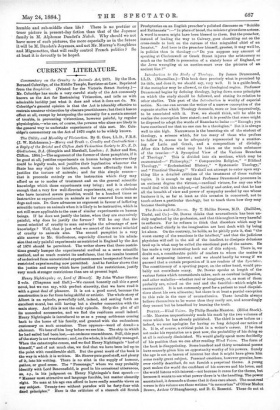Introduction to the Study of Theology. By James Drummond, LL.D.
(Macmillan.)—This book does precisely what is promised by its title, and does it, we should say, very well. It is a guide-book, if the metaphor may be allowed, to the theological region. Professor Drummond begins by defining theology, laying down some principles on which the study should be followed, and stating its relation to other studies. This part of the Introduction is worthy of especial notice. No one can accuse the writer of a narrow conception of the cognate studies which Theology demands, more or less imperatively, to be associated with it. Few, we should think, will be able to realise the conception here stated ; and it is possible that some might be disposed to adopt the words of Rasselas to Imlac :—" Enough ; you have convinced me that no one can be a theologian." But it is always well to aim high. Narrowness is the besetting sin of the student of theology, a science which, for too many of those who profess to follow it, seems to be adequately represented by a smatter. ing of Latin and Greek, and a compendium of divinity. After this follows what may be taken as the main substance of the treatise—" A Synoptical View of the Various Branches of Theology." This is divided into six sections, which may be enumerated—" Philosophy," " Comparative Religion," " Biblical Theology," "Ecclesiastical History," " Systematic Theology," and " Practical Theology." We shall not attempt to enter upon any- thing like a detailed criticism of the treatment of these various topics. It is enough to say that Professor Drummond possesses in an eminent degree the virtues,—cardinal virtues, for any one who would deal with this subjeot,—of lucidity and order, and that he has all the breadth of view and power of sympathy needed by one whose business it is, as far at least as this occasion is concerned, not to teach others a particular theology, but to teach them how they may become theologians.
































 Previous page
Previous page